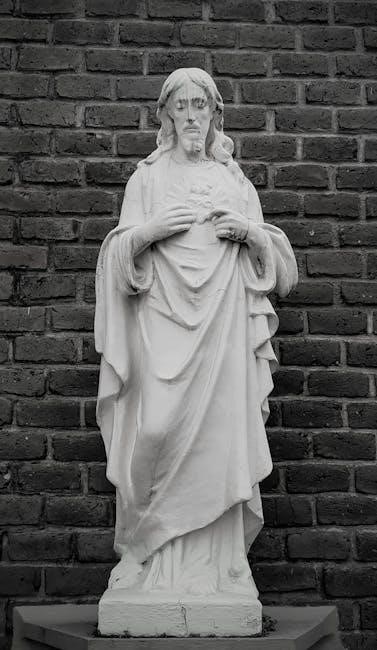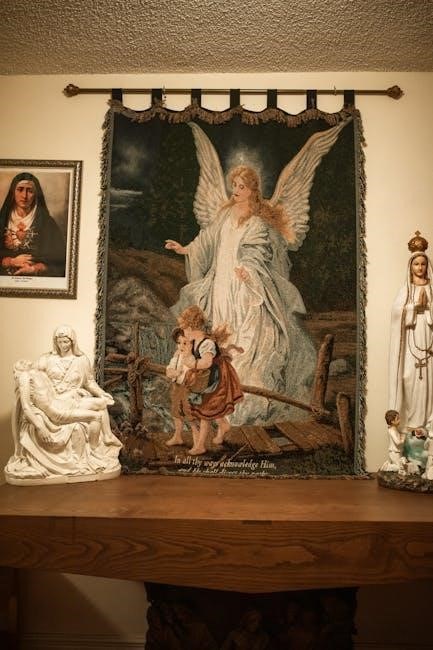This provocative book‚ translating to “Baby Jesus Doesn’t Hate Gays‚” sparks conversations on social acceptance and satire‚ challenging traditional norms through colorful‚ thought-provoking illustrations.
Overview of the Book’s Title and Theme
The book‚ titled “El Niño Jesús No Odia a Los Mariquitas” (translated as “Baby Jesus Doesn’t Hate Gays”)‚ uses satire and humor to address LGBTQ+ issues and societal prejudice. Its provocative title challenges traditional religious and cultural norms‚ blending religious imagery with contemporary themes. The book serves as a tool for sparking conversations about acceptance and inclusivity‚ using colorful‚ playful illustrations to make its message accessible. By blending art and social commentary‚ it aims to educate and inspire reflection on prejudice and equality‚ making it a unique and impactful work in the realm of social and political satire.
Historical Context of the Book’s Publication
“El Niño Jesús No Odia a Los Mariquitas” emerged in a time of heightened social and political discourse in Spain‚ particularly regarding LGBTQ+ rights and religious influence. The book’s publication coincided with a growing cultural shift toward progressive values‚ yet it also faced backlash from conservative groups. Drawing on the success of earlier works like SER FASCISTA ESTÁ MAL‚ the book became part of a series aimed at challenging societal norms through satire and art. Its release sparked widespread debate‚ reflecting the ongoing tension between traditional values and modern ideals in Spanish society.

Background of the Author and Publisher
The author‚ known for provocative satire‚ aims to challenge societal norms through bold narratives. The publisher‚ specializing in controversial content‚ supports works that spark cultural debates and reflections.
Biography of the Author
The author‚ Don Julio‚ is a controversial Spanish writer known for blending satire with social critique. His works often challenge religious and conservative norms‚ sparking debates across Spain. With a background in activism‚ Don Julio uses his platform to advocate for LGBTQ+ rights and free expression. His previous success with books like “Ser Fascista Está Mal” highlights his ability to provoke thought. By addressing taboo topics through humor and art‚ he aims to redefine cultural boundaries and broaden societal acceptance.
Publisher’s Profile and Motivation Behind the Book
The publisher‚ Ediciones Incómodas‚ is known for championing controversial and socially provocative works. Motivated by a commitment to free expression‚ they aimed to challenge conservative norms and spark dialogue. The book’s release aligns with their mission to push boundaries and question traditional values. By publishing El Niño Jesús No Odia a Los Mariquitas‚ they sought to address issues like homophobia and religious intolerance through satire. The publisher’s bold approach reflects their dedication to fostering cultural change and encouraging critical thinking‚ even in the face of backlash or legal challenges.

Themes and Messages in the Book
The book explores themes of social acceptance and LGBTQ+ rights‚ using satire to critique homophobia and religious intolerance‚ fostering empathy and challenging societal norms.
Exploration of Social Acceptance
The book delves into societal norms by using satire to challenge homophobia and promote empathy. Its vivid‚ controversial illustrations spark dialogue on acceptance‚ encouraging readers to question prejudices and embrace diversity. By blending humor with poignant themes‚ it critiques intolerance while fostering understanding. The backlash it received highlights its impact on societal conversations‚ making it a catalyst for change in perceptions of LGBTQ+ rights and religious symbolism. Its approachable format‚ like a coloring book‚ makes complex issues accessible‚ urging readers to reflect on their beliefs and the importance of inclusivity in modern society. This unique blend of art and activism underscores its cultural relevance.
Representation of LGBTQ+ Issues
The book boldly addresses LGBTQ+ themes through satire and religious imagery‚ challenging stereotypes and fostering empathy; By humanizing the community‚ it confronts discrimination and promotes understanding. The use of colorful‚ childlike illustrations contrasts sharply with the seriousness of the subject‚ making the message more accessible. The backlash it received underscores its impact‚ as it pushes boundaries and sparks necessary conversations. Through humor and provocative art‚ the book encourages readers to reflect on their views about gender‚ religion‚ and identity‚ ultimately advocating for inclusivity and the acceptance of diverse perspectives in society. Its approach has made it a significant cultural and social statement.

Controversy and Public Reaction
The book faced intense backlash‚ particularly from ultra-conservative groups in Spain‚ who deemed its content offensive and filed legal challenges‚ sparking debates on free expression and religion.
Ultra-Conservative Backlash in Spain
The book sparked intense outrage among ultra-conservative groups in Spain‚ who viewed its satirical portrayal of religious themes as blasphemous and offensive. Critics‚ particularly from religious factions‚ argued that the book mocked sacred figures and promoted ideologies they deemed immoral. The backlash was fueled by the book’s explicit challenge to traditional Catholic values‚ leading to public protests and heated debates in media. Conservative organizations and individuals accused the author of disrespecting religious sentiments‚ further polarizing public opinion. This strong reaction highlighted the deep cultural and ideological divides in Spanish society regarding religion‚ free expression‚ and LGBTQ+ rights.
Legal Challenges and Court Cases
The book faced legal challenges as ultra-conservative groups and religious organizations attempted to take the author to court‚ accusing the content of blasphemy and offending religious sensibilities. The legal battles centered on whether the book’s satirical tone and artistic expression crossed the line into illegal territory. Despite these efforts‚ the book’s defenders argued that it fell under freedom of speech and artistic expression. The court cases drew significant media attention‚ further polarizing public opinion and highlighting the tension between religious freedom and creative liberties in Spain. The legal disputes became a focal point in the broader cultural debate sparked by the book.

Cultural and Social Impact
The book became a cultural lightning rod‚ challenging societal norms and sparking debates on homophobia and religious satire‚ while also normalizing LGBTQ+ discussions in mainstream discourse.
Role in Shaping the Overton Window
The book played a significant role in expanding the Overton Window by bringing LGBTQ+ issues and religious satire into mainstream discourse. Its controversial nature challenged societal norms‚ prompting discussions on what is considered acceptable in public debate; By addressing homophobia and conservatism directly‚ it pushed boundaries‚ making once-taboo topics more mainstream. The backlash it received highlights its impact on shifting cultural perceptions. Through its provocative approach‚ the book contributed to a broader cultural shift‚ encouraging dialogue and redefining the limits of acceptable conversation in society.
Use of Satire and Artistic Expression
The book masterfully employs satire and artistic expression to critique societal norms and religious hypocrisy. By blending religious imagery with LGBTQ+ themes in a coloring book format‚ it challenges traditional views humorously yet provocatively. The simplistic‚ childlike art contrasts sharply with its bold message‚ amplifying its satirical impact. This unique approach sparks dialogue about prejudice and acceptance‚ using art as a powerful tool for social commentary. The book’s ability to provoke thought through creative expression highlights the enduring power of satire in addressing sensitive and deeply rooted issues.

Psychological and Educational Value
The book challenges stereotypes and fosters empathy‚ offering a unique tool for discussing prejudice. Its playful yet profound approach sparks conversations about acceptance‚ promoting open dialogue and understanding.
Impact on Children’s Perspectives
The book challenges stereotypes and fosters empathy in children by presenting a playful yet profound narrative. Its colorful illustrations and satirical approach encourage young minds to question prejudice and embrace diversity.
By addressing sensitive topics in an accessible way‚ it helps children develop inclusive perspectives. The story sparks curiosity and promotes dialogue‚ allowing kids to understand different viewpoints.
This approach not only educates but also empowers children to think critically about societal norms and acceptance. The book becomes a tool for parents and educators to discuss complex issues in a safe and engaging manner.
Educational Tools for Discussing Prejudice
The book serves as a catalyst for meaningful discussions about prejudice‚ offering educators a unique tool to address sensitive topics. Its blend of satire and art makes complex issues accessible.
The narrative encourages reflection on societal norms‚ providing a platform to explore themes of acceptance and inclusivity. Educators can use the book to foster empathy and critical thinking.
By incorporating such materials‚ classrooms can create safe spaces for dialogue‚ helping students understand the impact of prejudice and the importance of tolerance. This approach promotes a more inclusive and open-minded learning environment.
The book “El Niño Jesús No Odia a Los Mariquitas” challenges societal norms‚ fostering dialogue on acceptance and inclusivity while sparking controversy and legal debates.
Final Thoughts on the Book’s Significance
El Niño Jesús No Odia a Los Mariquitas is a bold‚ provocative work that challenges societal norms and fosters dialogue on inclusivity. Its blend of satire and artistic expression has sparked both praise and controversy‚ making it a memorable and thought-provoking read. By addressing sensitive topics like homophobia and religious hypocrisy‚ the book pushes boundaries and encourages reflection. Despite facing legal challenges and backlash‚ its impact on shaping public discourse is undeniable. Ultimately‚ it serves as a catalyst for change‚ urging readers to question prejudice and embrace acceptance in a divided world.